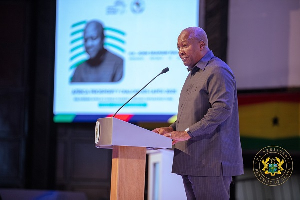The International Monetary Fund (IMF) has justified the privatization of Ghana Commercial Bank (GCB), arguing that state control of GCB in the past distorted its lending decisions, putting depositors and shareholders resources at risk.
In the Memorandum of Economic and Financial Policies of the Government of Ghana for 2003-05, the IMF categorically stated that the restructuring of Tema Oil Refinery (TOR) should clear the way for the privatization of Ghana Commercial Bank, the refinery’s main creditor.
“The divestiture of GCB is sufficiently important from the point of view of the overall soundness of the banking system that, it will serve as a structural benchmark under the government’s Poverty Reduction Growth Fund (PRGF) supported programme for 2003, with a target of not later than September 30, 2003 for cabinet approval of the wining bid”, says the IMF statement.
An IMF statement outlining the reasons for the sale of GCB obtained by Public Agenda stated among other things that the massive lending to Tema Oil Refinery (TOR) virtually crippled the bank and necessitated three government bailouts in the last three years. The IMF said the life-line given to GCB cost the taxpayer ?2 trillion, which could have been used for poverty reduction.
The IMF also argues that GCB’s provision of open-ended soft financing for TOR allowed the refinery to delay reforms of its own operations. IMF says TOR has also postponed the introduction of rational pricing regimes for petroleum in Ghana.
“If GCB were under private sector control, these distortion would be removed”, the IMF emphasised.
Perhaps, IMF’s true intentions are wrapped up in the third reason it gave for pushing the government to sell its majority shares of 46.8 percent.
“Experience all over the world shows that the private sector runs business better than the state. Putting GCB under private management should lead to improved efficiency and better services for the bank’s customers. Given GCB’s dominant role in Ghana’s financial sector, this could be significant factor in promoting the growth in Ghana’s economy.”
Business News of Monday, 19 May 2003
Source: Public Agenda
Cabinet To Rubber Stamp GCB Sale In September
News

Abundant evidence confirms lithovit's effectiveness: AG justifies withdrawal of Opuni-Agongo case
Sports













